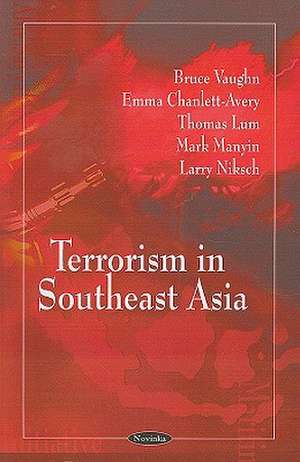Terrorism in Southeast Asia
Autor Bruce Vaughn, Emma Chanlett-Avery, Thomas Lumen Limba Engleză Paperback – 30 sep 2008
Preț: 226.02 lei
Preț vechi: 308.55 lei
-27% Nou
Puncte Express: 339
Preț estimativ în valută:
43.25€ • 45.36$ • 36.00£
43.25€ • 45.36$ • 36.00£
Carte indisponibilă temporar
Doresc să fiu notificat când acest titlu va fi disponibil:
Se trimite...
Preluare comenzi: 021 569.72.76
Specificații
ISBN-13: 9781604568509
ISBN-10: 160456850X
Pagini: 94
Ilustrații: b/w maps
Dimensiuni: 146 x 216 x 8 mm
Greutate: 0.16 kg
Editura: Nova Science Publishers Inc
ISBN-10: 160456850X
Pagini: 94
Ilustrații: b/w maps
Dimensiuni: 146 x 216 x 8 mm
Greutate: 0.16 kg
Editura: Nova Science Publishers Inc
Cuprins
Preface; Overview; The 9/11 Commission's Recommendations; Background -- The Rise of Islamic Militancy and Terrorism in Southeast Asia; The Rise of Al Qaeda in Southeast Asia; The Jemaah Islamiyah Network; History of Jemaah Islamiyah; Jemaah Islamiyah's Relationship to Al Qaeda; Jemaah Islamiyah's Size and Structure; Major Plots and Attacks; The Trial of Baasyir; Recent Activities; Focus Countries; Indonesia; Background; Shifts in Jakarta's Counter-Terrorism Policy; Recent Developments; The Philippines; Thailand; Role of Congress/Legislation; Indonesia; The Philippines; Thailand; Role of Congress/Legislation; Indonesia; The "Leahy" Amendment Restriction on Military Aid; The Impact of 9/11; FY2005 Request for Indonesia, the Philippines, and Thailand; Other CRS Products Dealing with Terrorism in Asia; Index.
